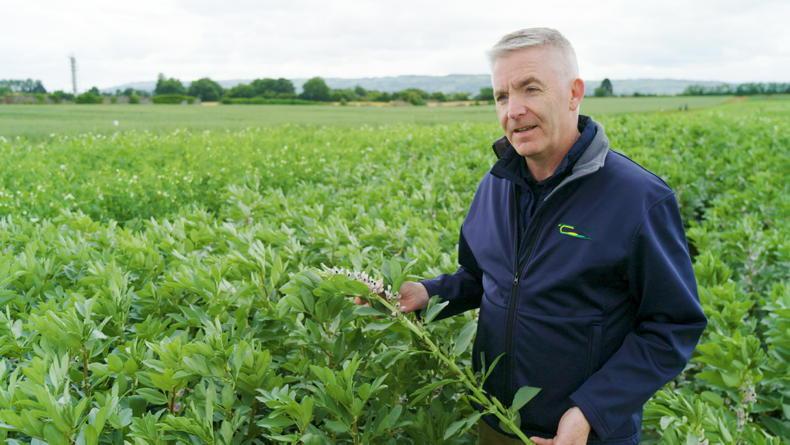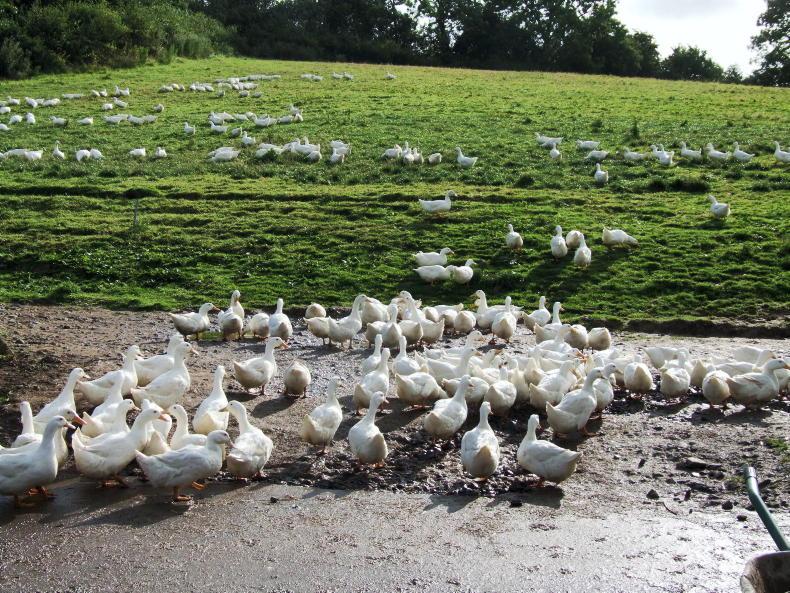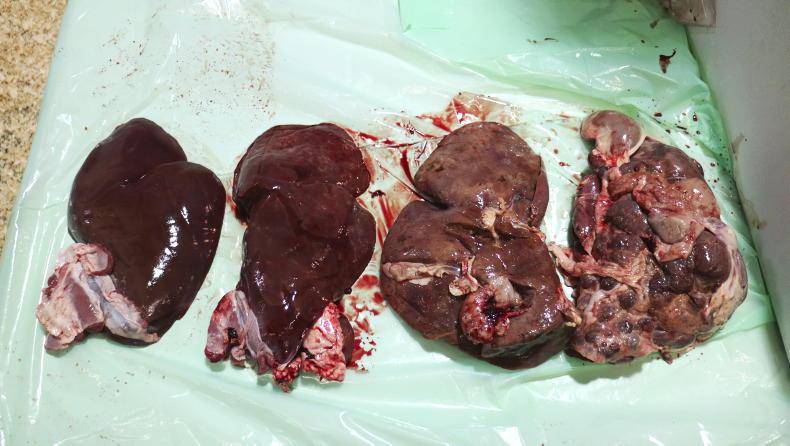Bloat Issues
I had a call this week about an animal that died from bloat on a high clover pasture. Incidence of bloat can increase as the content of clover in pastures gets higher or animals are grazing very lush after-grass type grazing. Bloat occurs when gas pockets occur in the rumen of the animal and cannot escape. Clover swards and leafy pasture are very easy and quick to digest and this increases the chances of bloat occurring. Certain animals tend to be prone to bloat and it is an inheritable trait.
If bloat is an issue, consider including some long fibre in the diet such as straw or hay. Add to a round feeder in the field animals are grazing. If bloat continues to occur, consider taking the field out for silage. Avoid letting very hungry animals into these pastures as they could gorge grass and this will increase the chances of bloat. Bloat oil can be added to the water on a daily basis and this will help reduce the chances of it occurring.
Grazing
It’s a tale of two halves this week: the south crying out for rain while the north got plenty on Tuesday night. If you are dealing with drought conditions and growth is very slow, try to slow down the rotation. Introduce hay or silage to prolong the amount of time animals can be kept in a paddock. Maybe hold off spreading slurry on silage aftermaths as this will also slow recovery. Grazing headlands of silage fields can buy a few extra days. Feeding meal will also help slow things up a little. Avoid topping or mowing paddocks until rain is forecast. This will slow up regrowths. Autumn-calving cows could be weaned at this stage and closed up on a bare paddock and you can concentrate on feeding the calves well with after-grass and meal. If you are highly stocked you will need to keep spreading fertiliser to ensure high growth rates return when moisture returns.
Dosing
I was speaking to a vet during the week who is becoming increasingly worried about wormer resistance in all classes of wormer. The vet had observed resistance in white wormers, yellow wormers and clear worming products over the last 12 months. Some of the cases resulted in death where the farmer had dosed but still lost animals and a PM confirmed heavy worm and hoose infection.
Faecal samples should be taken to determine whether a dose is required or not and it is good practice to take a faecal sample one to two weeks after the dose to see if it worked or not. If it hasn’t worked, speak to your vet about changing products and the next course of action. Teagasc recently found increased levels of worm resistance as part of a trial on commercial farms around the country and it is something of which farmers need to be aware.
BEEF 2018
The Teagasc National Beef open day takes place in Teagasc Grange, Co Meath, next Tuesday 26 June from 9.30am-5pm. Huge crowds are expected and anybody with an interest in the beef industry should attend. Drop in to the Irish Farmers Journal stand beside the livestock demo for a cup of tea and a chat.
Read more
What’s new at Teagasc BEEF 2018
Bloat Issues
I had a call this week about an animal that died from bloat on a high clover pasture. Incidence of bloat can increase as the content of clover in pastures gets higher or animals are grazing very lush after-grass type grazing. Bloat occurs when gas pockets occur in the rumen of the animal and cannot escape. Clover swards and leafy pasture are very easy and quick to digest and this increases the chances of bloat occurring. Certain animals tend to be prone to bloat and it is an inheritable trait.
If bloat is an issue, consider including some long fibre in the diet such as straw or hay. Add to a round feeder in the field animals are grazing. If bloat continues to occur, consider taking the field out for silage. Avoid letting very hungry animals into these pastures as they could gorge grass and this will increase the chances of bloat. Bloat oil can be added to the water on a daily basis and this will help reduce the chances of it occurring.
Grazing
It’s a tale of two halves this week: the south crying out for rain while the north got plenty on Tuesday night. If you are dealing with drought conditions and growth is very slow, try to slow down the rotation. Introduce hay or silage to prolong the amount of time animals can be kept in a paddock. Maybe hold off spreading slurry on silage aftermaths as this will also slow recovery. Grazing headlands of silage fields can buy a few extra days. Feeding meal will also help slow things up a little. Avoid topping or mowing paddocks until rain is forecast. This will slow up regrowths. Autumn-calving cows could be weaned at this stage and closed up on a bare paddock and you can concentrate on feeding the calves well with after-grass and meal. If you are highly stocked you will need to keep spreading fertiliser to ensure high growth rates return when moisture returns.
Dosing
I was speaking to a vet during the week who is becoming increasingly worried about wormer resistance in all classes of wormer. The vet had observed resistance in white wormers, yellow wormers and clear worming products over the last 12 months. Some of the cases resulted in death where the farmer had dosed but still lost animals and a PM confirmed heavy worm and hoose infection.
Faecal samples should be taken to determine whether a dose is required or not and it is good practice to take a faecal sample one to two weeks after the dose to see if it worked or not. If it hasn’t worked, speak to your vet about changing products and the next course of action. Teagasc recently found increased levels of worm resistance as part of a trial on commercial farms around the country and it is something of which farmers need to be aware.
BEEF 2018
The Teagasc National Beef open day takes place in Teagasc Grange, Co Meath, next Tuesday 26 June from 9.30am-5pm. Huge crowds are expected and anybody with an interest in the beef industry should attend. Drop in to the Irish Farmers Journal stand beside the livestock demo for a cup of tea and a chat.
Read more
What’s new at Teagasc BEEF 2018









SHARING OPTIONS